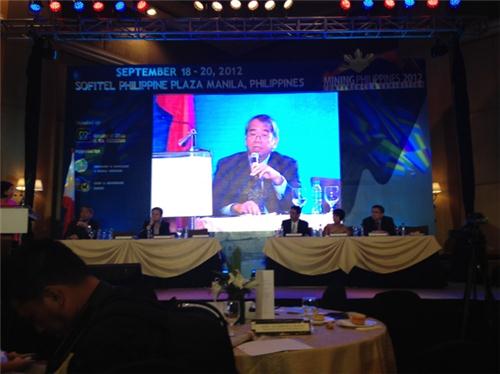SUMMARY
This is AI generated summarization, which may have errors. For context, always refer to the full article.

MANILA, Philippines – The mining industry has legal basis to contest the Aquino administration’s mining policy, a litigation lawyer said on Wednesday, September 19.
One provision of the Executive Order 79 (EO 79) the Aquino administration released in July has at least 3 Constitutional breaches, which would be enough to invalidate the policy, shared Emmanuel Lombos, a senior partner of Sycip Salazar Hernandez Law Offices during the 2nd day of the 2012 Mining Conference in Pasay City.
He focused on the provisions on the “no-go areas” or areas that will be closed to mining operations. These were mentioned in both the EO 79 and its Implementing Rules and Regulations (IRR) released respectively on July 9 and September 11.
“You need only one constitutional flaw and the measure becomes void. In the case of the no-go mining areas, there are three,” he told the audience at the conference.
These legal flaws on the no-go areas shared by Lombos are separate from another provision in the IRR that Chamber of Mines of the Philippines president Philip Romualdez has earlier described as “patently illegal”. The IRR effectively reduces into half the maximum 50-year term of mining contracts.
(Follow the Live Blog on the 2012 Mining Conference for a blow-by-blow account of issues being discussed.)
Unconstitutional provision
Lombos said the provisions on the no-go areas violate the power of Congress to craft laws since the government, through the mining policies, is going ahead and specifying areas closed to mining.
“There should be a clear separation of powers,” he explained. “The law will come from Congress but the executive branch of the government identifies the areas. With this, there is a clear unconstitutional usurpation of legislative powers.”
Lombos noted that the EO mentioned that these are areas that will be used for agriculture, fisheries, tourism, as well as others described as “critical areas.”
The EO mandates the environment, agriculture and tourism departments of the government to determine these areas. The IRR, on the other hand, said it the task would be assigned to the national mapping agency, which would then be the basis of the other government offices in choosing what areas are closed to mining.
Mining is preferred
The policy also goes against the dictates of the Constitution, which prioritizes mining over other land use when an area is identified as highly-mineralized lands.
This “violates Constitutional preference for mining,” said Lombos.
Lombos quoted the Supreme Court: “Once minerals are discovered in the land… the land is thus converted to mineral land and may not be used by any private party for any other purposes.”
With the closing of additional mining areas for other means, the Constitutional preference is breached, he said.
What critical areas?
He found a third reason: The definition of “critical areas” is “vague and incomprehensible”.
The IRR mandates the national mapping agency to identify certain island ecosystems and other areas to be closed to mining operations.
“Every ecosystem is in some sense unique and no such thing as a robust and invulnerable ecosystem. Therefore, any one of the 7,700 islands in the country can be closed to mining at DENR’s caprice,” he said, referring to the Department of Environment and Natural Resources.
This prohibition is not allowed by due process, Lombos said, adding that the government should cease from coming up with incomprehensible or vague policies as these are incapable of appropriate enforcement.
“It can be applied to anything and everything,” Lombos said.
Environmental concerns
The no-go areas has been pushed by environmental and other interest groups that are advocating against mining given the industry’s past sins.
Several mining accidents have been catastrophic, and some–like mine tailings spills–have not yet been addressed, adding to the uproar against mining.
Environment Secretary Ramon Paje has said that the Aquino government would like to ensure that mining is done responsibly, and that parallel efforts to doing that is looking for alternative uses for the land eyed by mining firms. – Rappler.com
Read the Blog on the 2012 Mining Conference for a blow-by-blow account of issues being discussed.
For the existing mining contracts in the Philippines, view this #WhyMining map.
How does mining affect you? Are you pro or against mining? Engage, discuss & take a stand! Visit Rappler’s #WhyMining microsite for the latest stories on issues affecting the mining sector. Join the conversation by emailing whymining@rappler.com your views on the issue.
For other views on mining, read:
| Yes to Mining | No to Mining |
More on #WhyMining:
- Shaping the future of mining
- EO: No new mining contracts
- The Mining EO: A mixed bag
- Mining E.O. not perfect, but very good
- CONVERSATIONS: What are your thoughts on the mining EO? #WhyMining
- Mining E.O. pits gov’t vs local execs
- Correcting lies and disinformation
- Stand for the environment
- How can mining work for Philippines?
- Mining is a social justice issue
- REPLAY: #WHYMINING
Add a comment
How does this make you feel?
There are no comments yet. Add your comment to start the conversation.